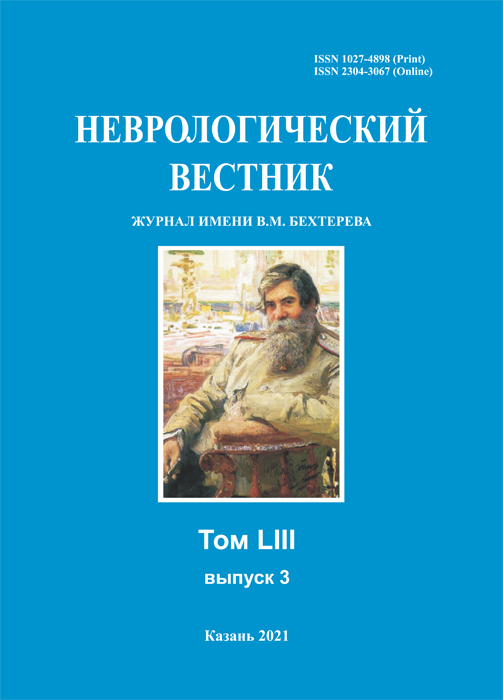The effect of brain neurotrophic factor gene polymorphism on the effectiveness of therapeutic and rehabilitation measures in patients with psychostimulant dependence
- Authors: Poplevchenkov K.N.1, Agibalova T.V.1, Zastrozhin M.S.1, Buzik O.Z.1
-
Affiliations:
- Moscow Research and Practical Centre for Narcology of the Department of Public Health
- Issue: Vol LIII, No 3 (2021)
- Pages: 26-32
- Section: Original study arcticles
- Submitted: 07.10.2021
- Accepted: 18.10.2021
- Published: 04.12.2021
- URL: https://journals.eco-vector.com/1027-4898/article/view/82801
- DOI: https://doi.org/10.17816/nb82801
- ID: 82801
Cite item
Abstract
Justification. Along with the rising consumption of psychostimulants, the number of patients with dependence on psychostimulants is increasing all over the world and in Russia in particular. At the same time, the number of patients with dependence on drug combinations is increasing, most of which are psychostimulants.
Aim. The aim of the work is to develop a personalized approach to the therapy of patients with dependence on psychostimulants, taking into account the polymorphism of the neurotrophic factor gene of the brain.
Material and methods. 305 patients with dependence on psychostimulants, men and women from 18 to 50 years old, were studied. Depending on the drug used and their combinations, as well as the presence of comorbid psychiatric pathology, all patients were divided into 6 groups. Research methods: molecular-genetic, clinical-psychopathological, catamnestic, statistical (parametric and nonparametric methods using Statistica 10.0 programs of STAT Soft Inc., USA). The effect of polymorphism of the neurotrophic factor gene of the brain on the effectiveness of therapeutic and rehabilitation measures in patients in different groups was evaluated.
Results. It was found that patients who use only psychostimulants and psychostimulants with cannabinoids, having a homozygous (GG) genotype of the neurotrophic factor gene of the brain, are longer in the rehabilitation program and have the longest remissions.
Conclusion. Polymorphism of the neurotrophic factor gene of the brain affects the effectiveness of therapeutic and rehabilitation measures in patients with dependence on psychostimulants.
Full Text
About the authors
Konstantin N. Poplevchenkov
Moscow Research and Practical Centre for Narcology of the Department of Public Health
Author for correspondence.
Email: poplevchenkov@mail.ru
ORCID iD: 0000-0001-5940-8682
SPIN-code: 5420-8277
Cand. Sci. (Med.), Senior researcher
Russian Federation, 37/1, Ljublinskaya street, Moscow, 109390Tatyana V. Agibalova
Moscow Research and Practical Centre for Narcology of the Department of Public Health
Email: agibalovatv@mail.ru
ORCID iD: 0000-0003-1903-5265
SPIN-code: 2859-1293
Dr. Sci. (Med.), Professor, Chief Scientific Officer
Russian Federation, 37/1, Ljublinskaya street, Moscow, 109390Michael S. Zastrozhin
Moscow Research and Practical Centre for Narcology of the Department of Public Health
Email: mszastrozhin@gmail.com
ORCID iD: 0000-0003-0607-4812
SPIN-code: 5681-4767
Dr. Sci. (Med.), Chief Scientific Officer
Russian Federation, 37/1, Ljublinskaya street, Moscow, 109390Oleg Z. Buzik
Moscow Research and Practical Centre for Narcology of the Department of Public Health
Email: ozhbuzik@gmail.com
ORCID iD: 0000-0001-9470-6781
SPIN-code: 7140-5795
Dr. Sci. (Med.), Chief Scientific Officer
Russian Federation, 37/1, Ljublinskaya street, Moscow, 109390References
- World Drug Report 2021: kratkij obzor. Net narkotikam. Informacionno-publicisticheskij resurs. https http://www.narkotiki.ru/5_98922.htm (access date: 07.10.2021). (In Russ.)
- Koshkina E.A., Bryun E.A., Kirzhanova V.V. et al. Monitoring of mental and behavioral disorders associated with the use of psychoactive substances in Moscow in 2017–2018. Narcology. 2020; 4: 24. doi: 10.25557/1682-8313.2020.04.22-34. (In Russ.)
- Lingford-Hughes A.R., Welch S., Peters L., Nutt D.J. BAP updated guidelines: evidence-based guidelines for the pharmacological management of substance abuse, harmful use, addiction and comorbidity: recommendations from BAP. J. Psychopharmacol. 2012; 26 (7): 899–952.
- Gudasheva T.A., Tarasiuk A.V., Povarnina P.Yu., Seredenin S.B. Brain-derived neurotrophic factor and its low-molecular mimetics. Farmakokinetika i farmakodinamika. 2017; 3: 3–5. (In Russ.)
- Popova N.K., Ilchibaeva T.V., Naumenko V.S. Neurotrophic factors (BDNF and GDNF) and the serotonergic system of the brain. Biochemistry. 2017; 82 (3): 308–317. (In Russ.)
- Golovko A.I. Brain neurotrophic factors. neurochemical and narcological aspects. Neurochemical Journal. 2008; 2 (4): 229–238. (In Russ.)
- Kibitov A.O., Solovieva M.G., Brodyansky V.M. A pilot study of genetic risk markers of internet addiction: the role of the brain-derived neurotrophic factor (BDNF) and dopamine receptor D4 (DRD4) genes. Journal of addiction problems. 2019; 6: 27–72. doi: 10.47877/0234-0623_2019_6_27. (In Russ.)
- Strauss J., Bernard P., Harper A. Towards a biopsychosocial psychiatry. Psychiatry. 2019; 82 (2): 103–112. doi: 10.1080/00332747.2019.1579609.
- Zuykova N.L., Spassky M.E., Chernov N.V. et al. Psychosocial rehabilitation of patients with schizophrenia and comorbid addictive pathology. Journal of addiction problems. 2017; 9 (157): 147–150. (In Russ.)
- Belokrylov I.V., Darenskiĭ I.D. Lichnostnye i sredovye faktory razvitiya zavisimosti ot psihoaktivnyh veshchestv. Rukovodstvo po narkologii. N.N. Ivanec ed. M.: Medpraktika. 2002; 161–181. (In Russ.)
- Fadeeva E.V., Grigor’eva A.A., Cvetkova O.V. Rezul’taty diagnostiki psihologicheskih osobennostej lichnosti, prediktorov zavisimogo povedeniya. Klinicheskaya i medicinskaya psihologiya: issledovaniya, obuchenie, praktika. 2015; 2 (8). http://www.medpsy.ru/climp/2015_2_8/article03.php (access date: 07.10.2021). (In Russ.)
- Shaar Maalouli M.A., Pchelkina E.P. Psihologicheskie osobennosti podrostkov, upotreblyayushchih psihostimulyatory. Psihologiya zdorov’ya i bolezni: kliniko-psihologicheskij podhod. Materialy VII Vserossijskoj konferencii s mezhdunarodnym uchastiem. Kursk. 2017; 352–358. (In Russ.)
- Kibitov A.O. Pharmacogenetic analysis as a tool for perso-nalization of prevention and rehabilitation programs in addiction psychiatry. Siberian gerald of psychiatry and addiction psychiatry. 2016; 2 (91): 24–30. (In Russ.)
- Zastrozhin M.S., Sychev D.A., Grishina E.A. et al. The effect on polymorphism of gene CYP3A5 on efficacy and safety of haloperidol in patients with alcohol addiction. Narcology. 2016; 12: 42–46. (In Russ.)
- Skryabin V.Yu., Zastrozhin M.S., Grishina E.A. et al. Effects of СYP2C19*2 genetic polymorphism on the efficacy and safety of diazepam in patients with alcohol withdrawal syndrome. Narcology. 2020; 1: 37–44. (In Russ.)
Supplementary files







